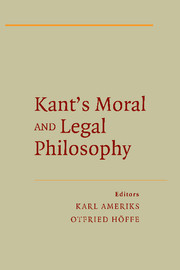Introduction
Published online by Cambridge University Press: 13 November 2009
Summary
Background
The widespread influence of Immanuel Kant's moral and legal philosophy is a striking exception to the division that can often be found between the approaches of modern European philosophy and the Anglophone analytic tradition. Although Kant's system as a whole exhibits a deeply cosmopolitan orientation even in its general foundations, his philosophy has become especially relevant in our time primarily because of the numerous practical implications of its central ideal of autonomy, which still determines the dominant liberal views of history, law, and politics.
The international reception of Kant's practical philosophy has become so enthusiastic that it has tended to stand in the way of an appreciation of the distinctive contributions of contemporary German Kant scholarship. This development is in one sense a compliment to the openness of German scholars to the outstanding achievements of earlier Anglophone Kantians such as H. J. Paton, Lewis White Beck, and John Rawls. In another sense, however, it may also be a testimony to the perplexing fact that for more than two centuries, Kant's ethics has often been displaced from a central position within Germany itself – even though, from the outside, it can appear to be nothing less than the obvious shining glory of German thought.
Even though Kant's views had an enormous influence on figures such as Schiller, Fichte, Hegel, Jean-Paul, and Kleist, these views were also quickly regarded as surpassed by the avant-garde in his homeland.
- Type
- Chapter
- Information
- Kant's Moral and Legal Philosophy , pp. 1 - 26Publisher: Cambridge University PressPrint publication year: 2009

